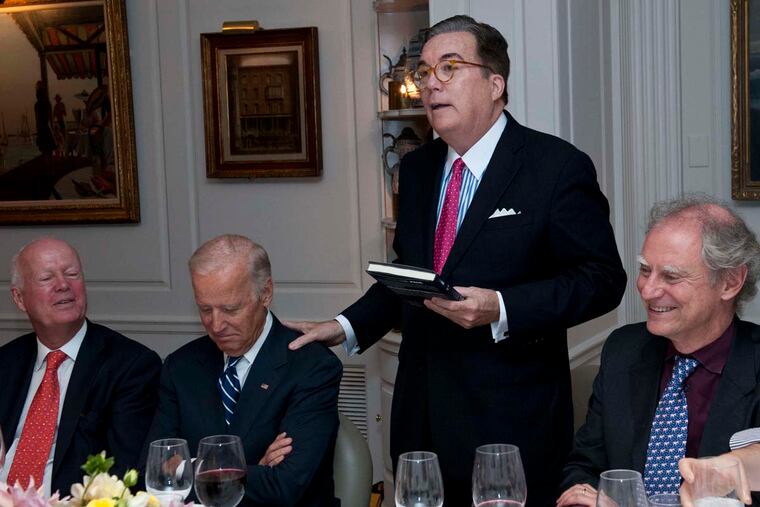The Bailout Debt
'We bet on America when everyone else was running for the hills," boasts hedge fund manager Gary Hindes. As an investigative reporter in the 1970s, Hindes was charged with trespassing in a federal archive in Wilmington. He later led Delaware's Democratic Party, helping Joe Biden build a prodigious network beyond its narrow borders.

'We bet on America when everyone else was running for the hills," boasts hedge fund manager Gary Hindes.
As an investigative reporter in the 1970s, Hindes was kicked out of a federal archive in Wilmington. He later led Delaware's Democratic Party, helping Joe Biden build a prodigious network beyond its narrow borders.
His Fallen Angels Fund buys deflated securities, and fights to reinject lost value. Often, that means fighting government agencies to fix what Hindes contends are wayward bailouts.
Hindes is tenacious: A leader of the speculators who bought Philadelphia Savings Fund Society (also known as Meritor Savings Bank) securities at deep discounts when the Federal Deposit Insurance Corp. shut the bank down in 1993, he waged a 20-year legal battle accusing regulators of killing it unfairly - and won. In 2013, the government paid investors $276 million, or $4 per zombie PSFS share.
Now, he's suing the Federal Housing Finance Agency and the U.S. Treasury, alleging that the government has high-handedly stripped Fannie Mae and Freddie Mac of more than $100 billion since they regained profitability in 2012.
He says that money should be applied against the cost of their 2008 taxpayer bailouts - while future profits should go to their patient investors.
Why, I asked, shouldn't taxpayers reap extra profits, because the government saved Fannie and Freddie from financial collapse?
Their quick recovery proves "they never needed to be bailed out," Hindes says. Citing a report last year by billionaire activist investor Bill Ackman's Pershing Square Capital Management hedge fund, Hindes notes that most of Fannie's and Freddie's reported deficits actually consisted of reserves set aside for bad subprime loans, which Fannie and Freddie should have avoided. The companies eventually forced Bank of America, Wells Fargo, and other major lenders to repay tens of billions for those bad loans. Hindes says they should have collected a lot more.
So this summer, Hindes filed a complaint, with fellow investor David Jacobs, in U.S. District Court in Delaware, demanding that the government observe what he calls the "rule of law" instead of illegally grabbing the companies' profits. Their lawyer is Myron T. Steele, who from 2004 to 2013 was chief justice of Delaware, the nation's preeminent jurisdiction for ownership and securities disputes.
The government wants the lawsuit dismissed; final briefs are due in January.
Other shareholders have actions seeking billions in compensation, analyst Nikola Swann noted Wednesday in a report to clients of Standard and Poor's Rating Services. If the courts take the investors' side and award fat damages, Congress may decide it's time to cut the government's ties to Fannie and Freddie, Swann concluded.
But Hindes says the companies are healthy, and he's more interested in future profits than past payments.
Separately, Delaware Bay Co., which Hindes chairs, is an investor in Penn Treaty Network America Insurance Co., an Allentown firm taken over by the Pennsylvania Insurance Department seven years ago, after it told Commonwealth Court the insurer was going broke.
Penn Treaty was a pioneer in selling long-term nursing-home coverage. Insurers used to price these policies as if subscribers might need them for a few weeks of acute care before they died. But in the 2000s, more people with Alzheimer's and other conditions moved to residential facilities and claims multiplied.
Hindes says state regulators have allowed other long-term care insurers to raise their rates to cover increased claims, but Pennsylvania resisted boosting Penn Treaty premiums beyond what the company promised before the state takeover.
He has asked Gov. Wolf and Commonwealth Court Judge Mary Hannah Leavitt to let Penn Treaty raise rates, erase its deficit, exit state control, and return millions to investors like him. Otherwise, Hindes says, solvent insurers and their customers may end up bailing out Penn Treaty through their guaranty fund.
"Mr. Hindes' individual feedback will be taken into consideration by the court," which is reviewing the state's Penn Treaty plan, said Insurance Department spokesman Ron Ruman.
Hindes says he's not against government rescues of troubled financial companies. Rather, echoing former Philadelphia Federal Reserve President Charles Plosser, he says regulators need to do a better job setting and following careful and limited rescue procedures when they do intervene.
In "resisting and exposing government misconduct," Hindes says, he's carrying out "the duty of every citizen in a democracy."
Of course, "if we happen to make money along the way, what's wrong with that?"
215-854-5194@PhillyJoeD